Sunday 2nd May
The North UF Church Sabbath School held a daffodil day to collect flowers for the Royal Infirmary and Sick Children’s Hospital in Edinburgh.
Jane Sunner, from Cork, Ireland, is a laundress, living in Drove Road. Her brother Henry, a quartermaster in the Royal Munster Fusiliers (Regulars), died today in the Dardanelles, aged 37.
Tuesday 4th May
Rev George Orr, minister of the North UF Church, was due to become moderator of the Hawick United Free Church Presbytery by rotation but said he was unable to accept the office due to his health.
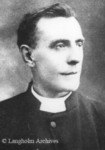
Chancellor of the Exchequer David Lloyd George reported that the cost of the war for the first eight months was £360 million [£30.8 billion], increasing the national debt to £1.17 billion [£100 billion].
Wednesday 5th May
The Langholm Woollen Mills’ Women’s Sick Society is unable to pay a dividend this year because of the high number of sickness claims.
The Clydesdale Horse Society has advertised the weekly itinerary of its breeding stallion Bonnie Kelso. He leaves his stable at Riddings Junction, 10 miles south of Langholm, on Tuesday mornings, arriving in Langholm at about one o’clock via East Canonbie. After staying overnight at the Eskdale Temperance Hotel’s stables, he leaves on Wednesdays at 11 a.m., returning via West Canonbie.
Lord Crewe explained aspects of the censorship system in the House of Lords. The cables branch deals with around 30,000 telegrams per day, employing 180 censors in the UK and 300-400 elsewhere across the Empire. The postal branch has about 500 censors and the Press Bureau has about 50.
Friday 7th May
The Cunard liner RMS (Royal Mail Ship) Lusitania was torpedoed without warning off the coast of Ireland on its way from New York to Liverpool. It sank in 18 minutes with the loss of around 1200 of the nearly 2000 on board, including 188 Americans among the dead, causing outrage in the USA.
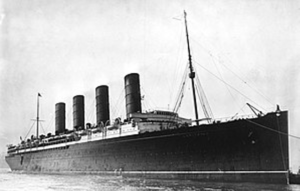
There were two passengers bound for Langholm, missionaries Rev James Beattie and his wife Margaret. James died, aged 53, but Margaret survived. James was born in Eskdalemuir, 13 miles northwest of Langholm, and stayed in Langholm last summer while visiting his father William, a retired shepherd. He preached at the North UF Church when Rev George Orr was on holiday. Margaret is from Stirling and intends to return to India, where she and James have lived for the past 20 years.
Thirteen wounded men from various regiments arrived at the Red Cross hospital, bringing the total to nearly 100 since opening last October.
The Langholm Gas Company has increased its gas price to five shillings per thousand cubic feet because of the high cost of coal and other materials.
Saturday 8th May
Private James Jardine of 2/5th KOSB died of influenza in Dumfries Hospital, aged 17. He was a bootmaker in Langholm and a keen member of the International Order of Good Templars and the EU Congregational Church.
The New Town Bowling Club green was opened with the usual match between the teams of the president and vice-president.
Many territorials in 1/5th KOSB are spending four days’ leave in Langholm before heading overseas. A dance was held for them in the Buccleuch Hall this evening, organised by Provost Easton and Robert McGeorge, solicitor, who have been active in recruitment.
Sunday 9th May
David Bell was killed in the Battle of Aubers Ridge, aged 39, serving with 2nd Battalion Black Watch (Royal Highlanders). He spent much of last winter in the trenches and was wounded but returned to his regiment after recovery. His brother William is with the Highland Light Infantry. The battle resulted in 11,000 British casualties for no gain of territory.
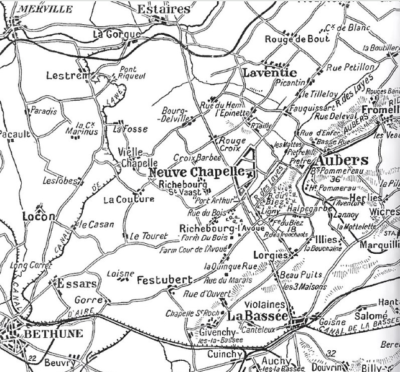
Rev George Orr visited William Beattie to break the news to him about the loss of his son James in the sinking of the Lusitania.
Monday 10th May
The territorials gathered at Buccleuch Hall and were led by Langholm Town Band to the railway station to catch the 8.30am train to their units.
James Cameron of the Royal Field Artillery, nephew of the Rev James MacDonald, minister of the South United Presbyterian Church, was killed in the Dardanelles. He was in an observation trench and saw some Lancashire Fusiliers moving into a dangerous position. He raised his head to warn them and was shot, dying twenty-five minutes later.
120 soldiers and 110 horses of the 2/1st Ayrshire Yeomanry are staying two nights while relocating from Lockerbie to Hawick. They paraded in the High Street in the afternoon before the soldiers were assigned to billets in hotels.
Tuesday 11th May
Private James Jardine’s coffin arrived at the railway station at 9.25 a.m. from Dumfries. He was buried in his father’s grave at Staplegordon Cemetery in a military ceremony.
The Common Riding committee passed a motion that the event should be cancelled in its entirety this year. This will be presented as a recommendation to the public meeting next week, when it will be for the town to decide whether to accept this.
Wednesday 12th May
Harrison & Son of Carlisle held one of its regular auctions in Langholm, with all available sheet and cattle being sold.
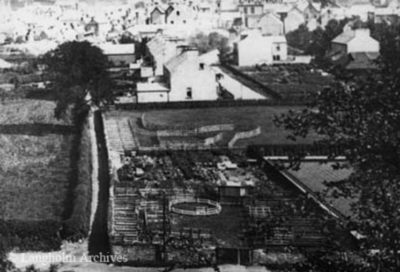
The E&L published photos of Sarah Scott, 6 Knox’s Buildings, and her five soldier sons, four of whom are on active service and the other is making munitions. Her husband William, a shoemaker, died three years ago.
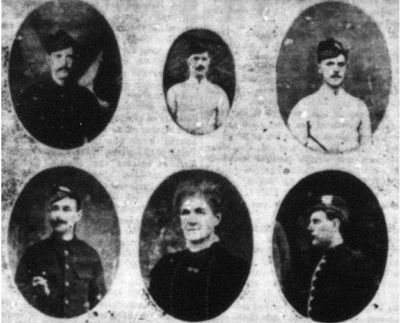
Charles Paisley, who owns a tannery next to the river, has donated £300 to Langholm EU Congregational Church. This replenishes an earlier donation, now depleted, by his uncle Walter Scott who owned the tannery until his death in 1899.
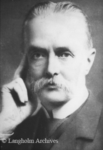
Charles Paisley, tanner (or ‘skinner’)
Selkirk’s town council has decided by a vote of 8-5 that its Common Riding will take place rather than be cancelled this year, but in a reduced form, with no races and no bunting.
The battleship HMS Goliath was torpedoed in the Dardanelles this evening with the loss of 570 out of 750 on board.
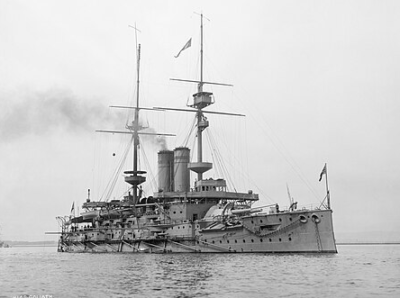
Thursday 13th May
The Old Town bowling green was opened with a match between president and vice-president and a tea, attended by Red Cross patients and nurses. Robert Ramage gave a speech inviting ladies to become members and the Red Cross patients to play for free. He said some may wonder how he and others can enjoy games during the war but that it is only age that prevents them from ‘shouldering the rifle’. He is honoured to play with bowlers who have sent members of their families to serve King and country.
In a town council meeting, it was decided not to replace Alexander Montgomery after his resignation until the annual meeting in November. The Hope Hospital was given an extension of three months for its temporary frontage as there are delays in obtaining iron railings due to the war. There is also a shortage of tar for the roads. Various licenses were issued: to ironmonger William Milroy to sell poisonous sheep dips; to the Temperance Hotel and the Milligan brothers for their halls as places of public amusement; and to the Milligan brothers for a licence under the Cinematograph Act.
Friday 14th May
The Times has published a report from war correspondent Colonel Charles à Court Repington, blaming a shortage of high explosive shells for the lack of British success at Aubers Ridge.
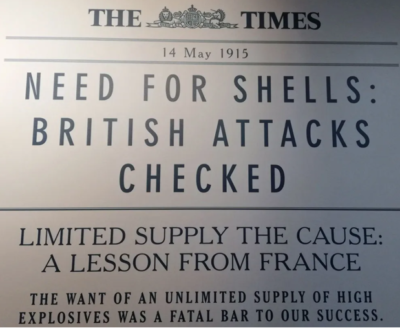
During its annual meeting, the Eskdale and Liddesdale Archaeological Society decided not to hold any lectures during the course of the war. The new Duke of Buccleuch has agreed to replace his late father as patron of the society. An excavation at Hollows did not find any evidence that it was the site of the original Gilnockie Tower inhabited by clan chief Johnny Armstrong, well known for his ‘reiving’ (raiding) activities.
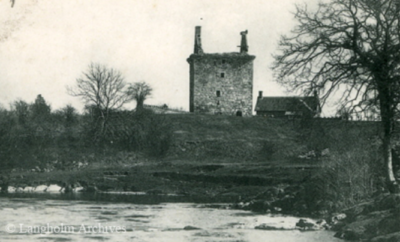
The Langholm Working Men’s Sick Society held an annual meeting, reporting that there were 101 sickness claims during the year, considerably more than average. £192 was paid out for sickness and £18 for funerals. The society exists on an annual basis and will be re-constituted for the coming year.
Saturday 15th May
Admiral Jackie Fisher has resigned as First Sea Lord (a military position) after severe tensions with Winston Churchill, First Lord of the Admiralty (a political position), over Gallipoli.
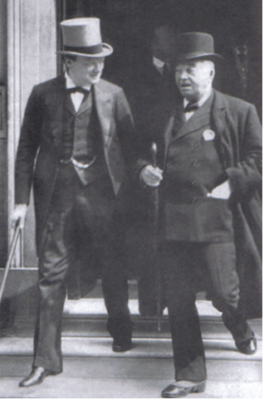
James Morrison, secretary of the Common Riding Committee, has given notice of the annual public meeting for the Common Riding next Thursday, which will include consideration of ‘the desirability of dispensing with the Common-Riding this year, on account of the War’.
The Junior Section of the Church of Scotland Woman’s Guild gave a display of 101 dolls in the infant school which are being sent to a mission representative in India. First prize for the best dressed doll was awarded to Agnes Notman, aged 13.
There have been various adverts for property lets, employment and ‘displenishment sales’ (stock clearances) in relation to Whitsunday, fixed as 15th May in Scotland for property valuation purposes (see Property Valuation and Tenancies).
Sunday 16th May
Minister-elect Richard Smith of the Congregational Church made special mention of Private James Jardine who died on 8th May. Although only 17, he was a church officer, Sunday School teacher and member of the choir.
Wednesday 19th May
David Bell, a labourer, was killed in the Battle of Aubers Ridge, aged 39, while serving with the Black Watch. He had been wounded a few months earlier but recovered and returned to action. He named Sara Latimer, sister of ironmonger Giles Latimer in the High Street, as next-of-kin, although they were not related or married.
Fred Ross, with the 2nd Gordon Highlanders in the Dardenelles, received a severe left arm wound on Sunday and passed out, remembering nothing more until today when he discovered that his arm had been amputated. In a letter home he does not mention his loss until the end, saying […].

Wednesday 19th May
1/5th KOSB marched to the railway station in Stirling, cheered by crowds. They have arrived in Liverpool and have boarded ship, awaiting departure.
Donald Stewart, son of the late John Stewart, a baker in the High Street, has been wounded in the Dardanelles and is in hospital in Alexandria, Egypt. He is an engineer in the Royal Naval Division which, despite its name, is an infantry division.
A new recruiting campaign has started for the 9th Battalion KOSB, to replenish regular army servicemen in the 6th, 7th and 8th Battalions.
Alice Turner, wife of the Lusitania’s captain, has offered a £100 reward to the captain of any merchant vessel who sinks a German submarine. It is the second time Captain William Turner has been shipwrecked, the first being in a storm off the north coast of Ireland when he was a cabin boy at around age 10.
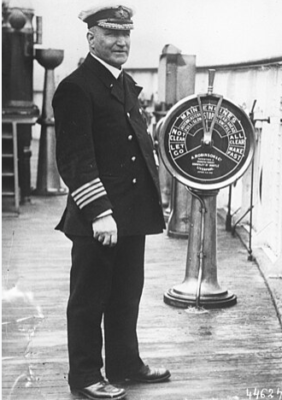
The town’s three butchers are increasing their prices again, due to the shortage of cattle: boiling beef up by one pence per pound and all other beef by two pence per pound.
Thursday 20th May
The annual Common Riding meeting took place in the Temperance Hall. John Goodfellow, painter, moved that the riding of the marches should take place as usual, seconded by Adam Grieve, stationer (cornet in 1912). Robert Ramage, plumber, moved that the meeting approve the committee’s recommendation of dispensing with the event altogether, seconded by William Storey, postman and former sergeant in the Seaforth Highlanders. This is not a time for merry-making, said Mr Ramage, and where would the horses and men come from, with nearly 500 men away on service? Trooper Thomas Reid moved that the morning’s proceedings go ahead, with sports in the afternoon for children only, but there was no seconder.
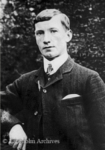
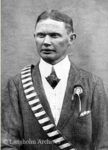
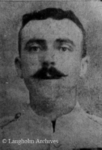
John Hounam asked if there would be any legal implications of not holding the event regarding common rights. Provost Easton replied that one year would not result in any loss; it would take several years for prescriptive rights to be affected.
Robert Ramage’s motion was carried on a show of hands, resulting in the cancellation of the entire event.
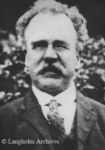
Friday 21st May
The Daily Mail led with the headline ‘The Shells Scandal: Lord Kitchener’s Tragic Blunder’, accusing him of ordering ineffective munitions for trench warfare (shrapnel shells instead of high explosives). Kitchener is a popular figure with the public and many soldiers, so the attack is causing much controversy.
Saturday 22nd May
Over 150 people, mostly Royal Scots soldiers, have been killed in two major collisions on the Caledonian Railway at Quintinshill, about a mile north of Gretna and 15 miles south-west of Langholm. A troop train travelling south ran into a stationary local passenger train at high speed, after which a north-bound express on the adjacent line ran into the wreckage. A huge fire broke out which has not yet been extinguished.
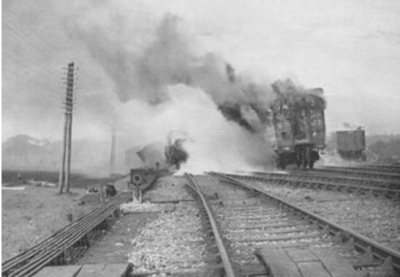
Dr Robert Watt and Dr Andrew Calwell have been providing assistance, as has Matron Mary Robertson from the Hope Hospital and Sister Byers from the Red Cross Hospital. The Hope Hospital has offered eight beds. General Sir Spencer Ewart also attended the scene.

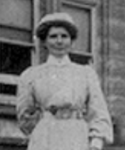
A Flag Day was held to raise funds for the Serbian Relief Fund and the Scottish Women’s Hospital in Serbia. Twenty young ladies undertook a collection in the town and surrounding area from 10 am until 9 pm.
Monday 24th May
Today was Empire Day (Queen Victoria’s birthday), when schoolchildren were taught about national heritage. Langholm Academy raised over £5 from pupils, which was used to buy several parcels of cigarettes to send to the trenches.
Langholm and Canonbie bootmakers gave notice of an increase of prices due to the cost of materials.
Tuesday 25th May
The Board of Trade conducted an enquiry into the Gretna disaster in Carlisle, questioning James Tinsley and George Meakin, signalmen on duty on the morning of the crashes.
Wednesday 26th May
A letter from ‘Onlooker’ to the E&L says that many are very annoyed about the Common Riding voting procedure, in which all hands were counted in the vote to cancel the event, but the hands of young people were excluded in the vote to proceed with a curtailed event. He appeals for letters to the E&L to insist on another meeting ‘so that the real feeling of the community might be made known’. In a swipe at Robert Ramage, he asks:
Is there any common-sense in holding open-air tea parties at the opening of bowling greens – for the first time in the history of Langholm bowling – while the country is at war, and appeal for the cessation of our one old-time custom of riding the common?
The cricket club held its annual meeting, chaired by the captain Fred Graham, and decided that no fixtures would be held during the war.
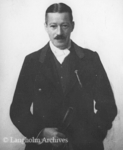
Sea trout are starting to appear in Association waters, the first one being caught by William Weatherstone, a mill worker.
Saturday 29th May
Quintinshill signalman James Tinsley was arrested at home and taken to Dumfries prison via the Dumfries Sheriff Court, pending further investigation.
Monday 31st May
James Paterson, cornet in 1909, farmer of Terrona and currently with the Queen’s Own Royal Glasgow Yeomanry in northern France, wrote to the E&L to say that he was ‘very disappointed to hear that Langholm had decided to abandon the Common-Riding this year. Personally I must say I think it a mistake’.
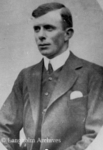
June>